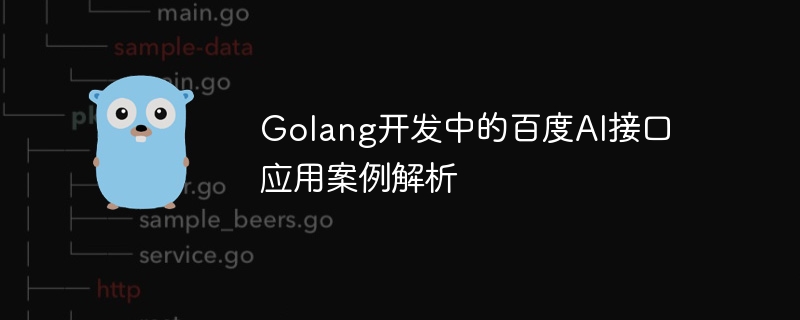

Analysis of Baidu AI interface application case developed in Golang
Introduction:
Artificial Intelligence (AI) is one of the hot topics in the current technology field , not only used in academic research, but also received widespread attention and application in industry. In the development of artificial intelligence applications, Baidu AI interface is a highly respected tool. This article will introduce how to use Golang to develop and apply Baidu AI interface, and analyze the case in the form of code examples.
1. Background introduction
Baidu AI Developer Platform is a cloud service platform that provides various artificial intelligence capabilities. Among them, interfaces such as text recognition, speech recognition, face recognition, and natural language processing are the most commonly used functions. As a simple and efficient programming language, Golang can easily call and use Baidu AI interface.
2. Environment preparation
Before starting Golang development, we need to prepare some necessary environments and tools:
3. Text recognition interface example
The text recognition interface can upload a picture and then return the text content in the picture. The following example shows how to use Golang to call Baidu AI interface for text recognition:
package main
import (
"fmt"
"io/ioutil"
"net/http"
"net/url"
"strings"
)
func main() {
// 设置接口地址和API Key、Secret Key
url := "https://aip.baidubce.com/rest/2.0/ocr/v1/general_basic?access_token=YOUR_ACCESS_TOKEN"
apiKey := "YOUR_API_KEY"
secretKey := "YOUR_SECRET_KEY"
// 读取图片文件
filePath := "test.jpg"
file, _ := ioutil.ReadFile(filePath)
// 设置请求参数
values := url.Values{
"image": {string(file)},
"language_type": {"CHN_ENG"},
}
// 发送POST请求
req, _ := http.NewRequest("POST", url, strings.NewReader(values.Encode()))
req.Header.Add("Content-Type", "application/x-www-form-urlencoded")
client := &http.Client{}
resp, _ := client.Do(req)
defer resp.Body.Close()
// 读取并输出请求结果
body, _ := ioutil.ReadAll(resp.Body)
fmt.Println(string(body))
}In the above example, we implement the call of Baidu AI text recognition interface by setting the api address, api key and secret key. Then we obtain the text recognition results by reading the image file, setting the request parameters and sending a POST request.
4. Speech recognition interface example
The speech recognition interface can convert speech into text. The following example shows how to use Golang to call Baidu AI interface for speech recognition:
package main
import (
"fmt"
"io/ioutil"
"net/http"
"strings"
"time"
)
func main() {
// 设置接口地址和API Key、Secret Key
url := "https://vop.baidu.com/server/api?cuid=YOUR_CUID&token=YOUR_ACCESS_TOKEN"
apiKey := "YOUR_API_KEY"
secretKey := "YOUR_SECRET_KEY"
// 读取语音文件
filePath := "test.wav"
file, _ := ioutil.ReadFile(filePath)
// 获取access token
tokenUrl := "https://aip.baidubce.com/oauth/2.0/token?grant_type=client_credentials&client_id=" + apiKey + "&client_secret=" + secretKey
resp, _ := http.Get(tokenUrl)
defer resp.Body.Close()
body, _ := ioutil.ReadAll(resp.Body)
accessToken := strings.Split(string(body), """)[3]
// 设置请求参数
values := url.Values{
"format": {"wav"},
"rate": {"16000"},
"channel": {"1"},
"cuid": {"YOUR_CUID"},
"token": {accessToken},
"len": {fmt.Sprintf("%d", len(file))},
"speech": {string(file)},
}
// 发送POST请求
req, _ := http.NewRequest("POST", url, strings.NewReader(values.Encode()))
req.Header.Add("Content-Type", "application/x-www-form-urlencoded")
client := &http.Client{Timeout: time.Second * 10}
resp, _ := client.Do(req)
defer resp.Body.Close()
// 读取并输出请求结果
body, _ := ioutil.ReadAll(resp.Body)
fmt.Println(string(body))
}In the above example, we implement the call of Baidu AI speech recognition interface by setting the api address, api key and secret key. We set the request parameters by reading the voice file and obtaining the access token, and obtain the results of the speech recognition by sending a POST request.
5. Summary
Through the case analysis of this article, we introduced how to use Golang to develop and apply Baidu AI interface. Among them, text recognition and speech recognition interfaces are just the tip of the iceberg of Baidu AI interfaces. Baidu AI developer platform also provides many other powerful interfaces, such as face recognition, image recognition, natural language processing, etc. I hope this article can provide some help and inspiration for readers to apply Baidu AI interface in Golang development.
The above is the detailed content of Analysis of Baidu AI interface application cases developed in Golang. For more information, please follow other related articles on the PHP Chinese website!
 How to light up Douyin close friends moment
How to light up Douyin close friends moment
 Advantages of downloading the official website of Yiou Exchange App
Advantages of downloading the official website of Yiou Exchange App
 How to enter the d drive with cmd
How to enter the d drive with cmd
 What should I do if my QQ account is stolen?
What should I do if my QQ account is stolen?
 Migrate data from Android phone to Apple phone
Migrate data from Android phone to Apple phone
 sort function python usage
sort function python usage
 Introduction to the main work content of front-end engineers
Introduction to the main work content of front-end engineers
 Photo display time
Photo display time




